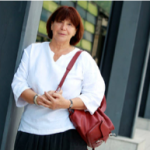by Dušana Findeisen
There have been many developments in the field of older people’s education, culture and social participation in the Danube region and elsewhere in Europe all of them devoted to improving older people’s social position, intergenerational dialogue (Women’s stories) quality of their life. Outstanding have been the results of the connections and cooperation of quite different institutions and educational providers within networks like DANET and ELOA, the ESREA’s research section dealing with older people’s education. Outstanding have been also some national achievements we have decided to write about in this DANET Newsletter like the 5th Festival of Knowledge and Culture in Later Life in Slovenia. There are also new actors in the field of older adult education and old age in general, like a new type of third age university in Romania , or OPRO an institute for applicative studies dealing with old age and social forces in Slovenia, new older people’s social practices as well as emerging research topics related to older people that need to be examined further, like the impact of education and culture on both objective and subjective older people’s quality of life or masculinities in older adult education.
The background paper to which we are introducing the readers discusses the research topic and social practices concerned with socially engaged education and socially engaged art of older people and the role of constructive leisure time for older people. It is not enough older adult education has just a few traditional functions (personal growth, empowerment, active citizenship). In the times of turbulent social changes each generation, each social group, each individual indeed need knowledge and skills to reposition themselves in society, defending their standpoints and quality of life, having a simultaneous regard on other generations. The repositioning will be more effective with older people’s engaged social visibility in mind, digital and social inclusion. Here older adult education has a great role to play.
There are great differences in perceiving the quality of life of older people in various cultural and urban contexts along the Danube and elsewhere in Europe. It seems that quality of life is closely connected with space, natural, built and social environments as well as historic, cultural and political contexts and their actors.
Quality of life is a concept, going beyond measuring objective life circumstances. Measuring subjective quality of life pertains to personal growth, happiness, healthy and secure environment, life satisfaction, well being in healthy society. In 2009 the Stiglitz-Sen-Fitoussi Commission proposed this concept should be included in measuring economic success and social development.
On the collective macro social level, however, political commodities as freedom, equality, active ageing, active citizenship, social fairness are to be measured as constituents of older people’s quality of life.

